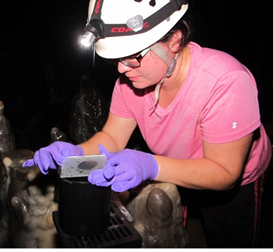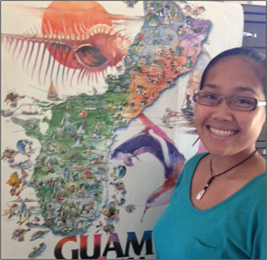Pacific Islands Climate Adaptation Science Center
PI-CASC
Pacific Islands Climate Adaptation Science Center
Undergraduate and Graduate Research
The Pacific Islands Climate Adaptation Science Center (PI-CASC) at the University of Guam (UOG) hosts undergraduate and graduate level students who conduct climate science research in various fields of study such as hydrology, business administration, education, and micronesian studies. Through these multi-disciplinary fields, the effects of climate change is measured in a wholistic approach that is specific to the Micronesian Region.
 |
Kaylyn Bautista
“Groundwater Pathways and Aquifer Recharge Rates in Guam”My research endeavor with PI-CASC includes updating a seven year collection of weekly rainwater sampling at UOG and monthly cave drip water sampling at one northern site, which after isotope analysis at the University of Texas at Austin. Alongside water geochemical tracing, a seven year record of cave stalactite drip counts provide clues to origins, residence times, pathways of fresh groundwater, and the relationships of aquifer recharge to rainfall, storms, and drought. |
 |
Phillip John R. Cruz
“Building Resiliency for Small Businesses in Guam”The island of Guam experiences natural disasters such as typhoons and droughts every decade. With the effects of Climate change predicting these natural disasters to increase in intensity, it is critical to assess how resilient small businesses are to these changes. Under the Pacific Islands Climate Adaptation Science Center (PI-CASC), this research project seeks to find new ways for small businesses to anticipate, monitor and adapt to changes in climate, forming sustainable models that can assist these businesses in thriving in a dynamic natural environment. |
 |
Cassandra-Jay T. Flores-Hughes
“Culturally Relevant Educational Resources on Climate Science”Locally produced educational resources and lesson plans concerning climate science in Guåhan are available, yet not always easily accessible in a central database. Efforts to acquire and utilize such resources to implement into lesson plans that meet eleventh and twelfth grade Common Core State Standards are needed by all local professionals and individuals to learn about climate science through a Pacific lens. Through PI-CASC, my research strives to unearth educational resources for individuals who seek knowledge on climate science to which is culturally relevant to Guam. In addition to this research, my project involves digitally archiving a collection of local historic maps and compiling Geographic Information System (GIS) survey responses for Micronesia.
|
 |
Chandra Legdesog
“Traditional Ecological Knowledge in Micronesia”Indigenous cultures contain knowledge and understanding of the environment developed through centuries of experience. Currently, the Pacific Region is facing rapid changes in climate. Because local and traditional practices inherently contain ecological knowledge that are particular to a place, identifying and re-valuing practices within the Micronesian Region will assist in sustainable and adaptive management practices.
|

